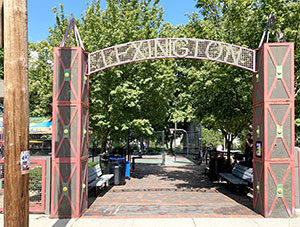
According to one local resident, trash bins located in public places like city parks should be upgraded to help in rodent abatement endeavors. — Photo by Bobbie Toner
By Eileen Qiu
A call to action for city officials to supply the Somerville’s 15 parks with solar compacting closed garbage cans came from one resident as she and her friends witnessed rodents rummaging around open trash bins.
Jean Horstman said she, her friends, and her friend’s children were leaving Lexington park one evening when they saw the rats. Horstman realized the open bins in the park present a danger to guests, especially children who may be exposed to rat droppings or urine.
Contact with rat urine can result in Weil’s Disease, a bacterial infection that causes fever, nausea, vomiting and chills, she said.
“In the almost 10 years of Somerville’s increasingly growing rat infestation/epidemic, the city has totally failed to ensure to provide the children and families who use our parks,” said Horstman.
The city takes an integrated and multi-method approach to rodent control, said a city spokesperson. Some effective solutions included a 311 hotline for residents when they need an inspector on a property or information about the Rodent Control Program, educational efforts to reduce rodent activity and an introduction of standardized trash and recycling bins with tight-fitting lids.

Jean Horstman’s own personal rodent control officer, the infamous Loki.
“Warmer winters have been shown to lead to increased rodent populations,” said Denise Taylor, the Director of Communications and Community Engagement. “So, one more aspect of climate change affecting the community as the planet warms is that we will need to remain vigilant in our efforts to reduce rodent activity. It will take the city, businesses, and individuals all working together to have the greatest success at that.”
With elections coming up, Horstman said the new mayor and council members should prioritize rodent control by supplying closed trash bins throughout the community.
As a project manager herself, Horstman calculated the cost of putting three BigBelly solar compactor garbage cans in each of the 15 parks and 10 on bike paths to be close to $400,000, less than 1 percent of the city’s budget. If three cans stretch the budget too much, Horstman thinks two cans that are emptied daily could be an effective solution as well.
She remembered the city putting the same ones on street corners years ago and thinks putting them in parks will help the city in deterring rodents.
Somerville has a Residential Rodent Control Assistance Program that extended free services to about 90 percent of the city, according to a city spokesperson. Participation increased by 300 percent as a result. The city is looking into the availability and the cost of different types of trash bins and containers for both the city parks and residential pickups as well.
“We understand the community’s frustrations and concerns and will continue to work with them and the Council to minimize rodent activity,” the spokesperson said.
Horstman’s own rodent control comes in the form of a 13-year-old white and orange cat named Loki. He is a former stray that Horstman adopted last August. He started bringing her carcasses within two weeks of his adoption and has killed around 40 rats, she said.
Horstman emphasized she respects the visions and values of city officials, but wants to see plans, performance measures, budgets and staff accountability for these types of hard quality of life issues that inequitably affect our poorer neighborhoods.
The Sommerville Rodent Control website states that working together as a community can aid in deterring rodents and reducing their numbers.
Horstman now checks the bins in Lexington and Albion Parks and the bike paths to see if they’ve been emptied. She hopes other neighbors will start doing the same.
“Our politicians and city employees, paid through our taxes, are not elected or hired to name a problem.” Says Horstman. “We put them in place and pay their salaries for them to solve a problem. That problem may be complex, multi-faceted, or complicated by unforeseen factors like the pandemic and it is still their job to find a solution. I would go so far to say that is their duty as public servants.”















Whoa whoa whoa whoa. You want to blow $400k of taxpayer money on 45 trashcans?!? That’s nearly $8900 per trash can. And will it even make a dent in the rat population?
Outrageous. Find a significantly cheaper way to cover public trash cans or keep the rats.
This video is on the City’s Rodent Control Program website.
https://www.youtube.com/watch?v=mupfBK1cYkw&t=272s
At 4:03, the rat specialist featured in this video–with Mayor Curtatone–speaks to the effectiveness of the solar powered compacting garbage cans in rat control.
joe doesn’t like to pay taxes. joe doesn’t want to participate in a civilized society. joe really likes rats. Don’t be a joe.
Anything the city does is never productive when it comes to rat eradication. It is amazing that the mayor ( who was chased by 2 rats on MacArthur st while out campaigning) would post such a video. The city uses bandaids when they need a tourniquet. Every corner and In-between Somerville is loaded with rats. A plague of biblical proportion. What Somerville needs is a Rat czar (which we had and a very good one but she resigned???) not a health inspector manager who does basically nothing. And we need a whole department with employees who enforce the ordinances and state laws governing and indeed criminal enforcement if necessary for landlords who do not obey the codes. Construction companies should also be strictly enforced.